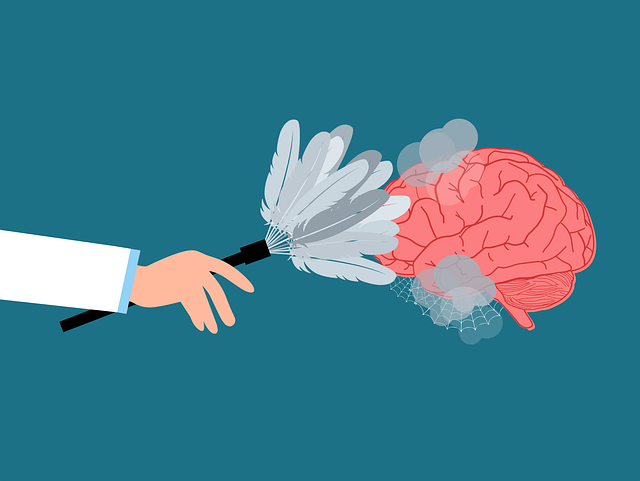Emotional Intelligence (EI) is a crucial asset for parents, especially in demanding lone tree environments, enhanced through Lone Tree Parenting Skills Therapy. This therapy equips parents with skills to recognize and manage their emotions, empathize with children, improve communication, resolve conflicts, and build resilience. Incorporating self-care, therapy, community outreach, and mental wellness coaching fosters healthy EI within families, enriching dynamics and promoting mental health development. Through practical strategies like self-awareness exercises, meditation, journaling, and open emotional conversations, lone tree parents create nurturing environments that strengthen relationships and foster well-rounded individuals.
Emotional intelligence (EI) is a powerful tool for parents, fostering healthier relationships and navigating the complexities of raising children. This article explores how understanding EI can transform Lone Tree parenting skills. We delve into the significant impact of therapy in enhancing emotional intelligence and providing practical strategies to build EI at home. By implementing these techniques, parents can create a more nurturing environment, improve communication, and better support their children’s emotional well-being.
- Understanding Emotional Intelligence and Its Impact on Parenting
- The Role of Therapy in Enhancing Lone Tree Parenting Skills
- Practical Strategies for Building Emotional Intelligence at Home
Understanding Emotional Intelligence and Its Impact on Parenting

Emotional intelligence (EI) is a powerful tool for parents to navigate the complex landscape of raising children. It involves recognizing and managing one’s own emotions, as well as understanding and empathizing with others’ feelings. In the context of Lone Tree parenting skills therapy, EI plays a pivotal role in fostering strong family connections and healthy child development. By cultivating emotional intelligence, parents can create a more nurturing environment, responding to their children’s needs with patience and empathy rather than reacting impulsively.
This skill set is crucial for effective communication, conflict resolution, and building resilience in both parents and children. Incorporating self-care practices alongside therapy sessions enables parents to improve their EI by managing stress and cultivating emotional awareness. As a result, they can extend these benefits to their parenting, positively influencing the family’s overall mental wellness. Community outreach program implementation and the development of mental wellness coaching programs can further enhance these efforts, providing additional support systems that promote and sustain healthy emotional intelligence in Lone Tree families.
The Role of Therapy in Enhancing Lone Tree Parenting Skills

In today’s fast-paced world, lone tree parenting can be a challenging endeavor. This is where therapy plays a pivotal role in enhancing and strengthening Lone Tree Parenting Skills. Professional counseling offers a safe space for parents to navigate the complexities of their roles, fostering emotional intelligence that is essential for effective childcare. Through therapy, parents learn valuable techniques for emotional regulation, which not only improves their own well-being but also creates a more stable and nurturing environment for their children.
Emotional intelligence, including positive thinking and effective communication strategies, forms the crux of these therapeutic interventions. By addressing underlying issues and adopting healthier coping mechanisms, lone tree parents can better manage stress, resolve conflicts, and foster stronger bonds with their kids. This holistic approach ensures that both the parent and the child thrive in a supportive setting, ultimately enriching the overall family dynamics.
Practical Strategies for Building Emotional Intelligence at Home

Building emotional intelligence at home is a valuable endeavor for parents aiming to nurture well-rounded individuals. Lone Tree Parenting Skills Therapy offers practical strategies to enhance this crucial aspect of personal development. One effective method is incorporating self-awareness exercises into daily routines. Encouraging open conversations about emotions, whether through storytelling or shared activities, allows children and adults alike to recognize and understand their feelings. This fosters a deeper sense of connection and empathy within the family unit.
Additionally, engaging in mental wellness practices such as meditation or journaling can significantly contribute to emotional intelligence development. A well-known Mental Wellness Podcast Series Production often highlights these techniques, providing accessible tools for parents to support their children’s emotional growth. By integrating these strategies into home life, families can create an environment that encourages healthy expression of emotions, strengthens relationships, and promotes overall public awareness campaigns development related to mental health.
Emotional intelligence is a powerful tool for anyone, but especially for parents. By understanding and managing their own emotions, as well as recognizing and responding sensitively to their children’s emotional needs, Lone Tree parents can create a supportive and nurturing environment. Integrating therapy into the parenting journey can significantly enhance these skills, providing strategies to navigate challenging situations with empathy and clarity. Combining this with practical at-home techniques allows for a holistic development of emotional intelligence, benefiting both parent and child in the long run.














